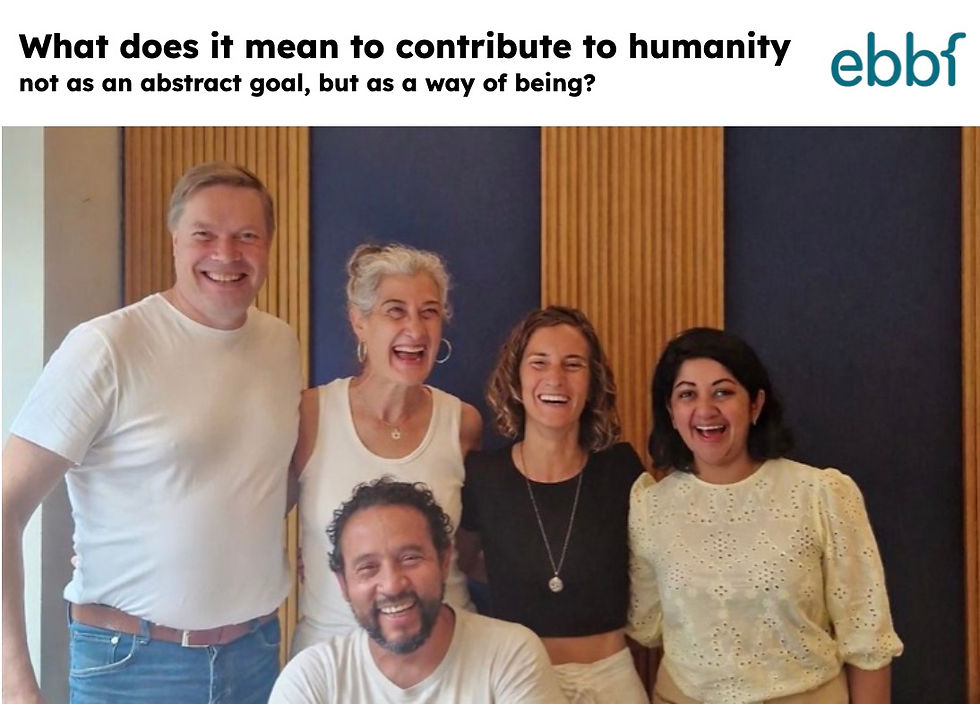#ebbfspirit – How can your business apply justice in an unjust environment? (with event keynot
- Sep 26, 2017
- 3 min read
A lively online interaction occurred during a recent ebbf online learning event with #ebbfspirit speaker Ralph Blundell. The curiosity of people from around the world who took part, was sparked by Ralph Blundell’s testing questions, exploring the topic of the keynote he will offer at
#ebbfspirit , “How can your business apply the principle of justice in an unjust business environment?”
He started by sharing his own personal journey and balance of accepting, demanding and living coherently justice in his varied career.
Ralph worked in the Third Sector and public sector till the end of the ’90s. He was focused on social action, working on the penal reform, using psyco-drama in prison, and on social issues like those of refugee resettlement from the Balkan war. He was also involved in the Labour Party with Tony Blair.
During his experience he realized two things: the frequent futility of politics and how helpful business was. It was the time for a switch to business where he thought the fastest road to change could be made. Business is a means by which you can act socially if you apply justice as a guiding principle, it has the agility and effectiveness to allow quick implementations of both bad and good trends.
But his connection with government also helped him see how public policy can unfold in two different directions: creating an enabling environment where civil society and business can take decisions and self regulate (e.g. Internet access, employment contracts etc.).
Or governments can create a controlling environment with rules and regulations strictly set by the central government. However as soon as the regulation is created from above, smarter people find a way around any such controls. It does not work because it is not intrinsic it does not come from within.
Ralph soon saw that in this environment being passive is a luxury reserved to the privileged and he definitely decided he’d not sit on that passive mode and instead look for active ways forward.
Justice is one of the seven ebbf Baha’i-inspired core values but it is also central to all the major religions in for example the golden rule of “treat your neighbour as you wish to be treated” justice and fairness are two pillars of the right kind of behaviours.
We as a race are living in our time of adolescence, a complex transition phase, one influenced by a high degree of uncertainty and the transition to adulthood is not possible unleess we achieve justice.
.
How passive or active we should be in this quest to tackle injustice? Being passive about justice doesn’t challenge injustice, doing nothing does not change the status quo. People don’t want equity, they want fairness. .
How assertive should we be? It is perfectly possible to claim Justice as a business principle by avoiding unjust situations. Arguably this changes nothing on a systemic level, and our responsibility is to be more assertive in striving for a just and prosperous society. Being non something means that you can be passive and you don’t need to do anything, I can be non sexist by not speaking about it but does not achieve anything does not challenge the injustice.
Instead we can decide to draw attention , being assertive is a moral and not a business driven decision. What needs to be made is a personal, a moral choice and if we we have this goal to contribute to a just prosperous and sustainable society we can enjoy that active role.
So we are compelled to be more assertive and we actually would find out that there is not that much resistance: people don’t want equality, people want fairness.
.
No right or wrong way to apply values, just make sure you think through the why behind your actions
The dilemma was offered of what might do when deciding whether to travel to a country with, for example an unjust immigration policy. One participant saw it as their role to make a point of not doing business with companies in that nation, as an active way to speak out for justice. Interestingly another participant decided to instead ignore the injustice of that nation and do business with specific individuals / companies that they felt they could help within that unjust system. Neither was seen as a good or bad decision, what as underlined was the important of thinking through your actions, stopping to first think whether they are a coherent way to live a specific value and then go ahead, also openly voicing why certain business decisions are taken.
.







Comments